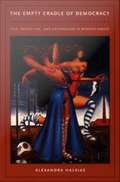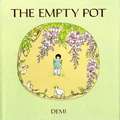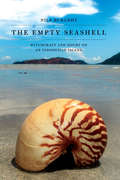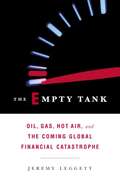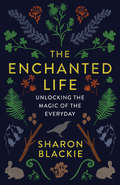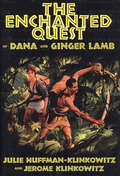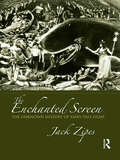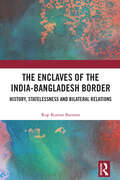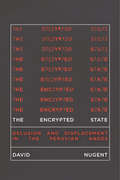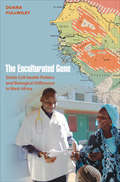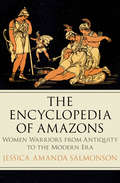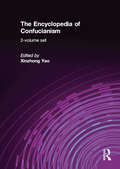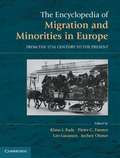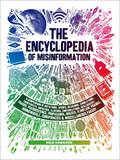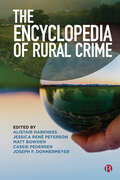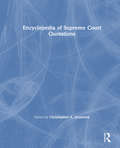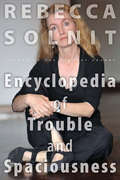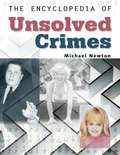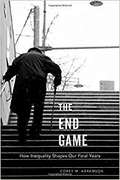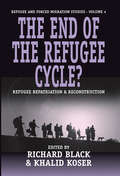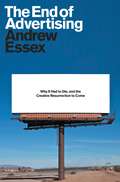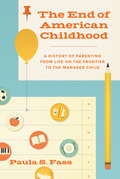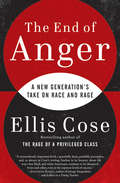- Table View
- List View
The Empty Cradle of Democracy: Sex, Abortion, and Nationalism in Modern Greece
by Alexandra HalkiasDuring the 1990s, Greece had a very high rate of abortion at the same time that its low birth rate was considered a national crisis. The Empty Cradle of Democracy explores this paradox. Alexandra Halkias shows that despite Greek Orthodox beliefs that abortion is murder, many Greek women view it as "natural" and consider birth control methods invasive. The formal public-sphere view is that women destroy the body of the nation by aborting future citizens. Scrutiny of these conflicting cultural beliefs enables Halkias's incisive critique of the cornerstones of modern liberal democracy, including the autonomous "individual" subject and a polity external to the private sphere. The Empty Cradle of Democracy examines the complex relationship between nationalism and gender and re-theorizes late modernity and violence by exploring Greek representations of human agency, the fetus, national identity, eroticism, and the divine. Halkias's analysis combines telling fragments of contemporary Athenian culture, Greek history, media coverage of abortion and the declining birth rate, and fieldwork in Athens at an obstetrics/gynecology clinic and a family-planning center. Halkias conducted in-depth interviews with one hundred and twenty women who had had two or more abortions and observed more than four hundred gynecological exams at a state family-planning center. She reveals how intimate decisions and the public preoccupation with the low birth rate connect to nationalist ideas of race, religion, freedom, resistance, and the fraught encounter between modernity and tradition. The Empty Cradle of Democracy is a startling examination of how assumptions underlying liberal democracy are betrayed while the nation permeates the body and understandings of gender and sexuality complicate the nation-building projects of late modernity.
The Empty Pot
by DemiA long time ago in China there was a boy named Ping who loved flowers. Anything he planted burst into bloom. The Emperor loved flowers too. When it was time to choose an heir, he gave a flower seed to each child in the kingdom. "Whoever can show me their best in a year's time," he proclaimed, "shall succeed me to the throne!" Ping plants his seed and tends it every day. But month after month passes, and nothing grows. When spring comes, Ping must go to the Emperor with nothing but an empty pot.
The Empty Seashell: Witchcraft and Doubt on an Indonesian Island
by Nils BubandtThe Empty Seashell explores what it is like to live in a world where cannibal witches are undeniably real, yet too ephemeral and contradictory to be an object of belief. In a book based on more than three years of fieldwork between 1991 and 2011, Nils Bubandt argues that cannibal witches for people in the coastal, and predominantly Christian, community of Buli in the Indonesian province of North Maluku are both corporeally real and fundamentally unknowable. Witches (known as gua in the Buli language or as suanggi in regional Malay) appear to be ordinary humans but sometimes, especially at night, they take other forms and attack people in order to kill them and eat their livers. They are seemingly everywhere and nowhere at the same time. The reality of gua, therefore, can never be pinned down. The title of the book comes from the empty nautilus shells that regularly drift ashore around Buli village. Convention has it that if you find a live nautilus, you are a gua. Like the empty shells, witchcraft always seems to recede from experience. Bubandt begins the book by recounting his own confusion and frustration in coming to terms with the contradictory and inaccessible nature of witchcraft realities in Buli. A detailed ethnography of the encompassing inaccessibility of Buli witchcraft leads him to the conclusion that much of the anthropological literature, which views witchcraft as a system of beliefs with genuine explanatory power, is off the mark. Witchcraft for the Buli people doesn't explain anything. In fact, it does the opposite: it confuses, obfuscates, and frustrates. Drawing upon Jacques Derrida's concept of aporia--an interminable experience that remains continuously in doubt--Bubandt suggests the need to take seriously people's experiential and epistemological doubts about witchcraft, and outlines, by extension, a novel way of thinking about witchcraft and its relation to modernity.
The Empty Tank: Oil, Gas, Hot Air, and the Coming Global Financial Catastrophe
by Jeremy LeggettIn The Empty Tank, Jeremy Leggett, an internationally renowned geologist and energy entrepreneur who spent the 1980s working for Big Oil, sounds the alarm about an unprecedented crisis. The oil topping point--the day half of all the world's oil is used up--will be reached, by many calculations, sometime soon. In fact, it may already be upon us. When the financial markets realize what's happening, an economic crash and soaring energy prices will result.
The Enchanted Life: Unlocking the Magic of the Everyday
by Sharon BlackieTaking as her starting point the inspiration and wisdom that can be derived from myth, fairy tales, and folk culture, Dr. Sharon Blackie offers a set of practical and grounded tools for enchanting our lives and the places we live, so leading to a greater sense of meaning and of belonging to the world. Enchantment. By Dr. Blackie’s definition, a vivid sense of belongingness to a rich and many-layered world, a profound and whole-hearted participation in the adventure of life. Enchantment is a natural, spontaneous human tendency — one we possess as children, but lose, through social and cultural pressures, as we grow older. It is an attitude of mind which can be cultivated: the enchanted life is possible for anyone. It is intuitive, embraces wonder, and fully engages the mythic imagination — but it is also deeply embodied in ecology, grounded in place and community.To live this way is to be challenged, to be awakened, to be gripped and shaken to the core by the extraordinary which lies at the heart of the ordinary.
The Enchanted Quest of Dana and Ginger Lamb
by Jerome Klinkowitz Julie Huffman-klinkowitzBestselling authors, sensational lecturers, documentary filmmakers, amateur archaeologists, spies for FDR—Dana and Ginger Lamb led the life of Indiana Jones long before the movie icon was ever scripted. “We blaze the trail,” Ginger said, “and the scientists follow.” The Enchanted Quest of Dana and Ginger Lamb is the first biography of this captivating, entrepreneurial couple. In southern California, they started married life in 1933 by building a canoe. With only $4.10 in their pockets, they paddled to Central America and through the Panama Canal. Three years later they returned triumphant, bearing a photographic record of the amazing trek that made them famous. After releasing their bestselling book, Enchanted Vagabonds, the two became exactly that. They relentlessly lectured for the public and mooned for the media until they were able to fund more exotic voyages to remote jungles and rivers. So convincing were they on the circuit that their most powerful fan, President Franklin Roosevelt, coerced J. Edgar Hoover into hiring the Lambs as spies in Mexico. After World War II, they launched their Quest for the Lost City, which yielded another book and documentary. Drawing on historical records, the Lambs' books and letters, and recently declassified espionage documents, biographers Julie Huffman-klinkowitz and Jerome Klinkowitz show how the Lambs succeeded in marketing their conquests and films to armchair explorers around the world and how they became, in popular imagination, the quintessential American adventurers.
The Enchanted Screen: The Unknown History of Fairy-Tale Films
by Jack ZipesThe Enchanted Screen: The Unknown History of Fairy-Tale Films offers readers a long overdue, comprehensive look at the rich history of fairy tales and their influence on film, complete with the inclusion of an extensive filmography compiled by the author. With this book, Jack Zipes not only looks at the extensive, illustrious life of fairy tales and cinema, but he also reminds us that, decades before Walt Disney made his mark on the genre, fairy tales were central to the birth of cinema as a medium, as they offered cheap, copyright-free material that could easily engage audiences not only though their familiarity but also through their dazzling special effects. Since the story of fairy tales on film stretches far beyond Disney, this book, therefore, discusses a broad range of films silent, English and non-English, animation, live-action, puppetry, woodcut, montage (Jim Henson), cartoon, and digital. Zipes, thus, gives his readers an in depth look into the special relationship between fairy tales and cinema, and guides us through this vast array of films by tracing the adaptations of major fairy tales like "Little Red Riding Hood," "Cinderella," "Snow White," "Peter Pan," and many more, from their earliest cinematic appearances to today. Full of insight into some of our most beloved films and stories, and boldly illustrated with numerous film stills, The Enchanted Screen, is essential reading for film buffs and fans of the fairy tale alike.
The Enclaves of the India-Bangladesh Border: History, Statelessness and Bilateral Relations
by Rup Kumar BarmanThis book examines the nature of statelessness in the India-Bangladesh enclaves. It traces the historical background and the causative factors for the origin and evolution of these enclaves in a specific geographical region of pre-colonial North Bengal. The author studies the ways in which colonial intervention in this region created administrative complications in the enclaves and critically examines the postcolonial changes in Indo-Bangladesh bilateral relations, especially in resolving boundary disputes. The volume also looks at the lives of the people inhabiting the enclaves and their struggle for survival amidst conflict. Rich in archival sources, the book will be an essential read for scholars and researchers of history, border studies, Indian history, South Asian politics, South Asian history, Partition studies, international relations, political studies, and refugee studies, especially those interested in India-Bangladesh relations.
The Encrypted State: Delusion and Displacement in the Peruvian Andes
by David NugentWhat happens when a seemingly rational state becomes paranoid and delusional? The Encrypted State engages in a close analysis of political disorder to shed new light on the concept of political stability. The book focuses on a crisis of rule in mid-20th-century Peru, a period when officials believed they had lost the ability to govern and communicated in secret code to protect themselves from imaginary subversives. The Encrypted State engages the notion of sacropolitics—the politics of mass group sacrifice—to make sense of state delusion. Nugent interrogates the forces that variously enable or disable organized political subjection, and the role of state structures in this process. Investigating the role of everyday cultural practices and how affect and imagination structure political affairs, Nugent provides a greater understanding of the conditions of state formation, and failure.
The Enculturated Gene
by Duana FullwileyIn the 1980s, a research team led by Parisian scientists identified several unique DNA sequences, or haplotypes, linked to sickle cell anemia in African populations. After casual observations of how patients managed this painful blood disorder, the researchers in question postulated that the Senegalese type was less severe. The Enculturated Gene traces how this genetic discourse has blotted from view the roles that Senegalese patients and doctors have played in making sickle cell "mild" in a social setting where public health priorities and economic austerity programs have forced people to improvise informal strategies of care. Duana Fullwiley shows how geneticists, who were fixated on population differences, never investigated the various modalities of self-care that people developed in this context of biomedical scarcity, and how local doctors, confronted with dire cuts in Senegal's health sector, wittingly accepted the genetic prognosis of better-than-expected health outcomes. Unlike most genetic determinisms that highlight the absoluteness of disease, DNA haplotypes for sickle cell in Senegal did the opposite. As Fullwiley demonstrates, they allowed the condition to remain officially invisible, never to materialize as a health priority. At the same time, scientists' attribution of a less severe form of Senegalese sickle cell to isolated DNA sequences closed off other explanations of this population's measured biological success. The Enculturated Gene reveals how the notion of an advantageous form of sickle cell in this part of West Africa has defined--and obscured--the nature of this illness in Senegal today.
The Encyclopedia of Amazons: Women Warriors from Antiquity to the Modern Era
by Jessica Amanda SalmonsonA unique, extensive A-to-Z encyclopedia of history's warrior women This is an astounding collection of female fighters, from heads of state and goddesses to pirates and gladiators. Each entry is drawn from historical, fictional, or mythical narratives of many eras and lands. With over one thousand entries detailing the lives and influence of these heroic female figures in battle, politics, and daily life, Salmonson provides a unique chronicle of female fortitude, focusing not just on physical strength but on the courage to fight against patriarchal structures and redefine women's roles during time periods when doing so was nearly impossible. The use of historical information and fictional traditions from Japan, Europe, Asia, and Africa gives this work a cross-cultural perspective that contextualizes the image of these unconventional depictions of might, valor, and greatness.
The Encyclopedia of Confucianism: 2-volume set
by Xinzhong YaoThe Encyclopedia, the first of its kind, introduces Confucianism as a whole, with 1,235 entries giving full information on its history, doctrines, schools, rituals, sacred places and terminology, and on the adaptation, transformation and new thinking taking place in China and other Eastern Asian countries. An indispensable source for further study and research for students and scholars.
The Encyclopedia of Migration and Minorities in Europe
by Klaus J. Bade Pieter C. Emmer Leo Lucassen Jochen Oltmer Marlou Schrover Michael Schubert Jutta Tiemeyer Corrie Van EijlAlthough migration and integration have become important concepts today as a result of globalization, migration movements, integration, and multiculturalism have always been part of the history of Europe. Few people realize how many ethnic groups participated in migration within Europe or into Europe and this ignorance has grave consequences for the social and political status of immigrants. Newly available to an English-speaking audience, this encyclopaedia presents a systematic overview of the existing scholarship regarding migration within and into Europe. The first section contains survey studies of the various regions and countries in Europe covering the last centuries. The second section presents information on about 220 individual groups of migrants from the Sephardic Jews emigration from Spain and Portugal in the sixteenth and seventeenth centuries to the present-day migration of old-age pensioners to the holiday villages in the sun. The first resource of its kind, The Encyclopaedia of Migration is a comprehensive and authoritative research tool.
The Encyclopedia of Misinformation: A Compendium of Imitations, Spoofs, Delusions, Simulations, Counterfeits, Impostors, Illusions, Confabulations, Skullduggery, ... Conspiracies & Miscellaneous Fakery
by Rex Sorgatz“In an era of ‘alternative facts,’ Rex Sorgatz’s The Encyclopedia of Misinformation helps put things in perspective.” —Fast CompanyThis compendium of misinformation, deception, and self-delusion throughout history examines fakery in the context of science and advertising, humor and law, sports and video games, and beyond. Entries span eclectic topics: Artificial Intelligence, Auto-Tune, Chilean Sea Bass, Clickbait, Cognitive Dissonance, Cryptids, False Flag Operations, Gaslighting, Gerrymandering, Kayfabe, Laugh Tracks, Milli Vanilli, P.T. Barnum, Photoshopping, Potemkin Villages, Ponzi Schemes, Rachel Dolezal, Strategery, Truthiness, and the Uncanny Valley. From A to Z, this is the definitive guide to how we are tricked, and how we trick ourselves.“Occasional salty language and pop-culture references make this compendium of 300 short entries a delightful mix of high- and lowbrow.” —Booklist
The Encyclopedia of Rural Crime
by Alistair HarknessThe key reference guide to rural crime and rural justice, this encyclopedia includes 85 concise and informative entries covering rural crime theories, offences and control. It is divided into five complementary sections: • theories of rural crime; • rural crime studies; • rural criminal justice studies; • rural people and groups; • rural criminological research. With contributions from established and emerging international scholars, this authoritative guide offers state-of-the-art synopses of the key issues in rural crime, criminology, offending and victimisation, and both institutional and informal responses to rural crime.
The Encyclopedia of Supreme Court Quotations
by Christopher A. AnzaloneA veritable feast of 1,500 quotes from more than 1,000 Supreme Court decisions, this is the first such reference devoted solely to the Supreme Court. Dating from the beginning of the Republic to the present, these excerpts provide a powerful historical overview of the mission and majesty of the Supreme Court. They are topically arranged and cover the legislative, judicial, and executive branches; states' rights; due process; free speech; equal rights; and freedom of religion.Each entry features the quote -- especially chosen for its profound, compelling, and inspirational nature; the name of the case, primary citation, year, and author; and the kind of decision (dissenting, concurring, or opinion of the Court).
The Encyclopedia of Trouble and Spaciousness
by Rebecca SolnitThe incomparable Rebecca Solnit, author of more than a dozen acclaimed, prizewinning books of nonfiction, brings the same dazzling writing to the essays in Encyclopedia of Trouble and Spaciousness. As the title suggests, the territory of Solnit's concerns is vast, and in her signature alchemical style she combines commentary on history, justice, war and peace, and explorations of place, art, and community, all while writing with the lyricism of a poet to achieve incandescence and wisdom.Gathered here are celebrated iconic essays along with little-known pieces that create a powerful survey of the world we live in, from the jungles of the Zapatistas in Mexico to the splendors of the Arctic. This rich collection tours places as diverse as Haiti and Iceland; movements like Occupy Wall Street and the Arab Spring; an original take on the question of who did Henry David Thoreau's laundry; and a searching look at what the hatred of country music really means.Solnit moves nimbly from Orwell to Elvis, to contemporary urban gardening to 1970s California macramé and punk rock, and on to searing questions about the environment, freedom, family, class, work, and friendship. It's no wonder she's been compared in Bookforum to Susan Sontag and Annie Dillard and in the San Francisco Chronicle to Joan Didion.The Encyclopedia of Trouble and Spaciousness proves Rebecca Solnit worthy of the accolades and honors she's received. Rarely can a reader find such penetrating critiques of our time and its failures leavened with such generous heapings of hope. Solnit looks back to history and the progress of political movements to find an antidote to despair in what many feel as lost causes. In its encyclopedic reach and its generous compassion, Solnit's collection charts a way through the thickets of our complex social and political worlds. Her essays are a beacon for readers looking for alternative ideas in these imperiled times.
The Encyclopedia of Unsolved Crimes
by Michael NewtonAmateur sleuths, mystery lovers, and reality show buffs will find much to contemplate in this encyclopedia of unsolved crimes committed around the world in the 19th and 20th centuries. Each of the 500-plus cross-referenced entries includes a detailed description of the crime, all known evidence, and leading theories about the perpetrators. Newton, who has written several references about crime and specializes in books about serial murders, briefly mentions in his introduction some of the intriguing cases that were solved during preparation of this volume, and so were deleted. Annotation ©2004 Book News, Inc., Portland, OR (booknews.com)
The End Game
by Corey M. AbramsonSenior citizens face a gauntlet of physical, psychological, and social hurdles. But do disadvantages accumulated over a lifetime make the final years especially difficult for some people? Or does the quality of life among poor and affluent seniors converge? Corey Abramson investigates whether lifelong inequality structures the lives of the elderly.
The End Of Capitalism (As We Knew It): A Feminist Critique of Political Economy
by J.K. Gibson-GrahamIn the mid-1990s, at the height of academic discussion about the inevitability of capitalist globalization, J. K. Gibson-Graham presented a groundbreaking and controversial argument for envisioning alternative economies. This new edition includes an introduction in which the authors address critical responses to The End of Capitalism and outline the economic research and activism they have been engaged in since the book was first published. &“Paralyzing problems are banished by this dazzlingly lucid, creative, and practical rethinking of class and economic transformation.&” —Meaghan Morris, Lingnan University, Hong Kong &“Profoundly imaginative.&” —Eve Kosofsky Sedgwick, City University of New York &“Filled with insights, it is clearly written and well supported with good examples of actual, deconstructive practices.&” —International Journal of Urban and Regional Research J. K. Gibson-Graham is the pen name of Katherine Gibson and Julie Graham, feminist economic geographers who work, respectively, at the Australian National University in Canberra and the University of Massachusetts Amherst.
The End Of The Refugee Cycle?
by Khalid Koser Richard BlackAt the start of the 1990s, there was great optimism that the end of the Cold War might also mean the end of the "refugee cycle" - both a breaking of the cycle of violence, persecution and flight, and the completion of the cycle for those able to return to their homes. The 1990s, it was hoped, would become the "decade of repatriation." However, although over nine million refugees were repatriated worldwide between 1991 and 1995, there are reasons to believe that it will not necessarily be a durable solution for refugees. It certainly has become clear that "the end of the refugee cycle" has been much more complex, and ultimately more elusive, than expected. The changing constructions and realities of refugee repatriation provide the backdrop for this book which presents new empirical research on examples of refugee repatriation and reconstruction. Apart from providing up-to-date material, it also fills a more fundamental gap in the literature which has tended to be based on pedagogical reasoning rather than actual field research. Adopting a global perspective, this volume draws together conclusions from highly varied experiences of refugee repatriation and defines repatriation and reconstruction as part of a wider and interrelated refugee cycle of displacement, exile and return. The contributions come from authors with a wealth of relevant practical and academic experience, spanning the continents of Africa, Asia, Central America, and Europe.
The End of Advertising: Why It Had to Die, and the Creative Resurrection to Come
by Andrew EssexA recovering Mad Man throws down the ultimate challenge to his profession: Innovate or die.The ad apocalypse is upon us. Today millions are downloading ad-blocking software, and still more are paying subscription premiums to avoid ads. This $600 billion industry is now careening toward outright extinction, after having taken for granted a captive audience for too long, leading to lazy, overabundant, and frankly annoying ads. Make no mistake, Madison Avenue: Traditional advertising, as we know it, is over. In this short, controversial manifesto, Andrew Essex offers both a wake-up call and a road map to the future. In The End of Advertising, Essex gives a brief and pungent history of the rise and fall of Adland—a story populated by snake-oil salesmen, slicksters, and search-engine optimizers. But his book is no eulogy. Instead, he boldly challenges global marketers to innovate their way to a better ad-free future. With trenchant wit and razor-sharp insights, he presents an essential new vision of where the smart businesses could be headed—a broad playing field where ambitious marketing campaigns provide utility, services, gifts, patronage of the arts, and even blockbuster entertainment. In this utopian landscape, ads could become so enticing that people would pay—yes, pay—to see them.Advance praise for The End of Advertising“[Andrew] Essex’s extended soliloquy on advertising’s past, present, and future is informative and enjoyable.”—Publishers Weekly“A rabble-rousing indictment of the ad industry from one of its own. Essex predicts that success will depend less on the ability to annoy and more on the capacity to create and entertain.”—Adam Grant, New York Times bestselling author of Originals and Give and Take“Fresh and timely, The End of Advertising is an eye-opening take on the current media landscape. And along with it, Essex provides a road map for how brands can reinvent themselves and navigate this new world.”—Arianna Huffington“In this dynamic little book, Essex challenges brands—even those of us who pride ourselves on thinking outside the box—to think bigger still. He’s got me thinking.”—Neil Blumenthal, co-founder of Warby Parker“In this quick and compelling read, Essex presents a bracing view of a future that can’t get here soon enough. The End of Advertising should be mandatory reading for anyone who wants to get a message across in this age of authenticity.”—Alexis Ohanian, co-founder, Reddit
The End of American Childhood: A History of Parenting from Life on the Frontier to the Managed Child
by Paula S. FassThe End of American Childhood takes a sweeping look at the history of American childhood and parenting, from the nation's founding to the present day. Renowned historian Paula Fass shows how, since the beginning of the American republic, independence, self-definition, and individual success have informed Americans' attitudes toward children. But as parents today hover over every detail of their children's lives, are the qualities that once made American childhood special still desired or possible? Placing the experiences of children and parents against the backdrop of social, political, and cultural shifts, Fass challenges Americans to reconnect with the beliefs that set the American understanding of childhood apart from the rest of the world.Fass examines how freer relationships between American children and parents transformed the national culture, altered generational relationships among immigrants, helped create a new science of child development, and promoted a revolution in modern schooling. She looks at the childhoods of icons including Margaret Mead and Ulysses S. Grant--who, as an eleven-year-old, was in charge of his father's fields and explored his rural Ohio countryside. Fass also features less well-known children like ten-year-old Rose Cohen, who worked in the drudgery of nineteenth-century factories. Bringing readers into the present, Fass argues that current American conditions and policies have made adolescence socially irrelevant and altered children's road to maturity, while parental oversight threatens children's competence and initiative.Showing how American parenting has been firmly linked to historical changes, The End of American Childhood considers what implications this might hold for the nation's future.
The End of Anger
by Ellis CoseFrom a venerated and bestselling voice on American life comes a contemporary look at the decline of black rage; the demise of white guilt; and the intergenerational shifts in how blacks and whites view, and interact with, each other In the heady aftermath of President Obama's election, conventional wisdom suggested that the bitter, angry, and destructive elements of discrimination were ebbing at last and America was becoming a postracial nation. But with this dawning age that promised so much came shifting demographics and a newfound seat of rage in the polarizing Tea Party movement, even as black optimism gained ground, giving rise to questions about assumed truths concerning race in America. Combining the talents earned from a lifetime in journalism with the insights and thoughtfulness of a close observer of the American experience, renowned author Ellis Cose offers a fresh, original appraisal of our nation at this extraordinary time, tracking the diminishment of black anger and investigating the "generational shifting of the American mind." Weaving material from myriad interviews as well as two large and ambitious surveys that he conducted-one of black Harvard MBAs and the other of graduates of A Better Chance, a program offering elite educational opportunities to thousands of young people of color since 1963-Cose offers an invaluable portrait of contemporary America that attempts to make sense of what a people do when the dream, for some, is finally within reach as one historical era ends and another begins. In short, The End of Anger is not just about blacks but about America-its past and its hoped-for future-and may well be the most important book dealing with race to be published in recent decades.
